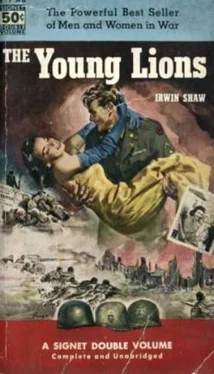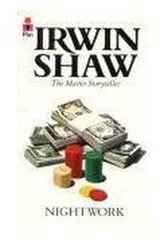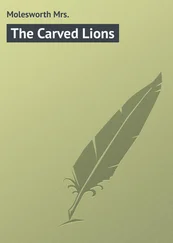Irwin Shaw - The Young Lions
Здесь есть возможность читать онлайн «Irwin Shaw - The Young Lions» весь текст электронной книги совершенно бесплатно (целиком полную версию без сокращений). В некоторых случаях можно слушать аудио, скачать через торрент в формате fb2 и присутствует краткое содержание. Жанр: Классическая проза, на английском языке. Описание произведения, (предисловие) а так же отзывы посетителей доступны на портале библиотеки ЛибКат.
- Название:The Young Lions
- Автор:
- Жанр:
- Год:неизвестен
- ISBN:нет данных
- Рейтинг книги:4 / 5. Голосов: 1
-
Избранное:Добавить в избранное
- Отзывы:
-
Ваша оценка:
- 80
- 1
- 2
- 3
- 4
- 5
The Young Lions: краткое содержание, описание и аннотация
Предлагаем к чтению аннотацию, описание, краткое содержание или предисловие (зависит от того, что написал сам автор книги «The Young Lions»). Если вы не нашли необходимую информацию о книге — напишите в комментариях, мы постараемся отыскать её.
The Young Lions — читать онлайн бесплатно полную книгу (весь текст) целиком
Ниже представлен текст книги, разбитый по страницам. Система сохранения места последней прочитанной страницы, позволяет с удобством читать онлайн бесплатно книгу «The Young Lions», без необходимости каждый раз заново искать на чём Вы остановились. Поставьте закладку, и сможете в любой момент перейти на страницу, на которой закончили чтение.
Интервал:
Закладка:
At the head of the convoy was a wagon on which was mounted an 88-millimetre anti-aircraft gun. The horses were dead in the traces, in wild attitudes of gallop and fear, and there was blood all over the gun and its mounting. The German Army, Christian thought dully, as he went past, horses against aeroplanes. At least, in Africa, when he retreated, he had retreated with the aid of engines. He remembered the motor-cycle and Hardenburg, the Italian staff car, the hospital plane that had crossed the Mediterranean with him, carrying him to Italy. It seemed to be the fate of the German Army, as a war went on, to go back to more and more primitive methods of fighting. Ersatz. Ersatz petrol, ersatz coffee, ersatz blood, ersatz soldiers…
He seemed to have been retreating all his life. He had no longer any memory of ever advancing anywhere. Retreat was the condition, the general weather of existence. Going back, going back, always hurt, always exhausted, always with the smell of German dead in his nostrils, always with enemy planes flickering behind his back, their guns dancing brightly in their wings, their pilots grinning because they were safe and they were killing hundreds of men a minute.
There was a loud blowing of a horn behind him, and Christian scrambled to one side. A small, closed car sped past, its wheels sending a fine cloud of dust over him. Christian got a glimpse of clean-shaven faces, a man smoking a cigar…
Then somebody was shouting, and there was the howl of engines above him. Christian lumbered away from the road and dived into one of the carefully spaced holes that had thoughtfully been provided by the German Army along many of the roads of France for the use of its troops at moments like this. He crouched deep in the damp earth, covering his head, not daring to look up, listening to the returning whine of the engines and the savage tearing sound of the guns. After two passes, the planes moved off. Christian stood up. He climbed out of the hole. None of the men he had been walking with had been touched, but the little car was overturned, against a tree, and it was burning. Two of the men who had been in it had been thrown clear, and were lying very still in the centre of the road. The other two men were burning in a welter of spilled petrol, torn rubber and whipcord upholstery.
Christian walked slowly to where the two men were lying facedown on the road. He did not have to touch them to see that they were dead.
"Officers," said a voice behind him. "They wanted to ride." The man behind him spat.
The other men walked past the two dead forms and the burning car. For a moment Christian thought of ordering some of the men to help him move the bodies, but it would have meant an argument, and at the moment it did not seem very important whether two bodies, more or less, were put to one side or not.
Christian slowly started eastward once more, feeling his bad leg shiver beneath him. He blew his nose and spat again and again to try to get the smell and the taste of the dead horses and the spilled medicine out of his mouth and throat.
The next morning he had a stroke of luck. He had pulled away from the other men during the night and had marched slowly on to the outskirts of a town, which lay across his path in the moonlight, dark, empty, seemingly lifeless. He had decided not to try to get through it by himself, at night, since it was all too possible that the inhabitants, seeing a lone soldier wandering past in the dark, might pick him off, rob him of his gun, boots and uniform, and throw him behind a hedge to rot. So he had camped under a tree, eaten sparingly of his emergency ration, and slept until daybreak.
Then he had hurried through the town, almost trotting down the cobbled road, past the grey church, the inevitable statue of victory with palms and bayonets in front of the town hall, the shuttered shops. No one was stirring. The French seemed to have vanished from the face of the land as the Germans retreated through it. Even the dogs and the cats seemed to understand that it was safer for them to hide until the bitter tide of defeated soldiers had passed.
It was on the other side of the town that his luck changed. He was hurrying, because he was still in sight of the walls of the last row of houses, and his breath was coming hoarsely into his lungs, when he saw, coming around a bend in the road ahead of him, a figure on a bicycle.
Christian stopped. Whoever it was on the bicycle was in a hurry. He kept his head down and pedalled swiftly towards where Christian was standing.
Christian moved to the middle of the road and waited. He saw that it was a boy, perhaps fifteen or sixteen years old, capless, dressed in a blue shirt and old French Army trousers, racing bumpily through the cool, misty dawn light between the still rows of poplars on each side of the road, casting a soft, elongated shadow of legs and wheels on the road in front of him.
The boy saw Christian when he was only thirty yards away. He stopped suddenly.
"Come here," Christian shouted hoarsely, in German, forgetting his French. "Walk over here."
He started towards the boy. For a moment the two of them stared at each other. The boy was very pale, with curly black hair and dark, frightened eyes. With a swift, animal-like movement, the boy picked up the bicycle by the front wheel and whirled it round. He was running with the bicycle before Christian could unsling his gun. The boy jumped on, bent over, with his blue shirt filling with wind behind him, and pedalled furiously back along the road, away from Christian.
Without thinking, Christian opened fire. He caught the boy with the second burst. The bicycle careered into the ditch alongside the road. The boy went sliding across the road to the other side, and lay there without moving.
Christian lumbered quickly along the uneven road, his boots making a thick thudding sound in the silent morning. He bent over the bicycle and picked it up. He rolled it back and forth. It was unharmed. Then he looked at the boy. The boy's head was twisted towards him, very pale and unmarked under the curly hair. There was a light fuzz of moustache under the slender nose. A red stain slowly spread across the back of the faded blue shirt. Christian made a movement towards the boy, but thought better of it. They'd have been bound to hear the shooting in the town, and if they found him there, they'd make short work of him.
Christian swung himself up on the bicycle and started east. After the weary days of walking, the ground seemed to spin past beneath him with wonderful swiftness and ease. His legs felt light; the dawning breeze against his cheeks was soft and cool; the light dewy green of the foliage on both sides of the road was pleasing to the eye. Now, he thought, it needn't be only officers who ride.
The roads of France seemed to have been made for bicyclists, with the paving in fair condition, and no high hills to slow a man down. It would be easy for a man to do two hundred kilometres a day… He felt youthful, strong, and for the first time since he had seen the first glider coming down out of the coastal sky that bad morning so long ago, he felt as though there was some hope for him. After half an hour, as he was gliding down a gentle slope between two fields of half-grown wheat, pale yellow in the morning sun, he found himself whistling, a vacation-like, holiday-like, tuneless, heart-free, merry sound, rising gay and natural in his throat.
All that day, he fled east along the road to Paris. He passed groups of men, walking, moving slowly in overloaded farm wagons stubbornly loaded with pictures and furniture and barrels of cider. He had passed refugees before in France, a long time ago, but it had been more natural then, because they were mostly women, children and old men, and you knew they had some reason to hold on to mattresses and kitchen pots and odds and ends of furniture because they hoped to set up domestic lives somewhere else. But it was strange to see a German Army trudging along in this way, young men with guns and uniforms, who could only hope either finally to be re-formed on some line and by some miracle turned around to fight – or to fall into the hands of the enemy who, it was rumoured, were closing in on them from all directions. In either case, framed paintings from Norman chateaux and cloisonne lamps would do them a minimum amount of good. With set faces, past all reasonableness, the defeated men streamed slowly towards Paris on the summer roads, officerless, without formations or discipline, abandoned to the tanks and the planes of the Americans who were following them. Occasionally a wheezing French bus, with a charcoal furnace, would drag past, loaded down with dusty soldiers, who on the hills would have to get out to push. Once in a while an officer could be seen, but he would keep his mouth shut, look as lost and deserted as any of the others.
Читать дальшеИнтервал:
Закладка:
Похожие книги на «The Young Lions»
Представляем Вашему вниманию похожие книги на «The Young Lions» списком для выбора. Мы отобрали схожую по названию и смыслу литературу в надежде предоставить читателям больше вариантов отыскать новые, интересные, ещё непрочитанные произведения.
Обсуждение, отзывы о книге «The Young Lions» и просто собственные мнения читателей. Оставьте ваши комментарии, напишите, что Вы думаете о произведении, его смысле или главных героях. Укажите что конкретно понравилось, а что нет, и почему Вы так считаете.











